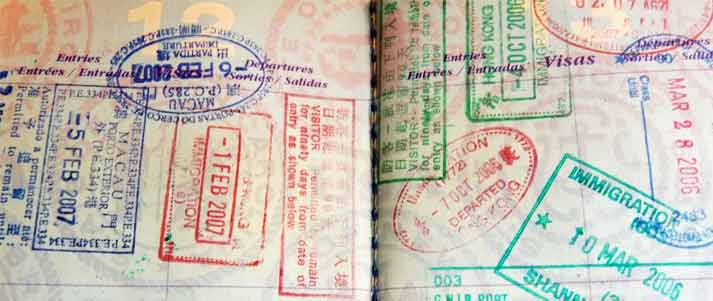TEFL guide: Get paid to teach English abroad
Ever thought about teaching English abroad? Find out how to get a TEFL qualification, how to find a job overseas, plus the biggest perks of the whole experience.

Whether you're thinking about moving into teaching, or you're looking for a job abroad while on a gap year, it's worth considering teaching English abroad.
There are several different ways you can do this. TEFL (Teaching English as a Foreign Language) opportunities vary widely depending on where you choose to travel, how much time and money you can spend on training, and which TEFL course provider you choose to train with.
If you want to teach English in a different country, this guide is the place to start your research.
What's in this guide?
What are TEFL courses and certificates?
TEFL is short for 'Teaching English as a Foreign Language'. It describes the experience of teaching English abroad and the process of studying to get the qualification to do so.
A TEFL qualification lets you travel the world and earn money in the process. It's also a chance to get to know a different culture (or cultures, depending on how many different countries you end up teaching in).
You may have come across different terms for teaching English abroad. We go through some of the slight differences between the terms below.
Differences between TEFL, ESL, TESL, and TESOL
There are loads of other abbreviations used to describe English teaching abroad, but don't let this overwhelm you. They generally mean very similar things, but there are slight variations, and it can help to know these when you're looking for the best courses.
Teaching English as a Foreign Language (TEFL)
As mentioned above, TEFL means teaching English in a country where it's not taught as a first language.
TEFL is the most common and widely-recognised course for teaching English abroad, which is why we focus on it in this guide.
Teaching English as a Second Language (TESL)
TESL differs from TEFL as it applies to teaching English to students who do not speak it as a first language but are based in a country where it's a native language.
If you wanted to stay in the UK or teach English in another country where it's a primary language (e.g. Australia or the USA) you could try TESL.
You might also see references to ESL which means English as a Second Language – it tends to refer to English classes for non-native speakers. Through TESL, you will be teaching ESL classes.
Teaching English to Speakers of Other Languages (TESOL)
TESOL is essentially like a combination of TEFL and TESL.
Teaching English to Speakers of Other Languages can refer to teaching English as a foreign language in a country like China or Russia, or teaching English to people who are learning it as a second language, in a country where English is a primary language (e.g. the UK).
Is a TEFL certificate worth it?

Credit: Rex Pe - Flickr
Here are the main benefits of getting a TEFL certificate:
-
It makes you more employable
Whether you're interested in a career in teaching or not, choosing to do a TEFL course after graduation is a great way to start your career – whatever industry you're keen to move into later.
A common misconception is that TEFL is only suitable for those interested in pursuing teaching, but this certainly isn't the case.
If you want to travel but worry about taking a full year off from work, teaching English is a great way to avoid any gaps in your CV – and travel makes for a great addition to your CV.
-
You will develop vital work skills
A TEFL qualification will look great on your CV and teaching English abroad allows you to gain some invaluable and transferable skills.
Skills and qualities you will gain from TEFL
- Adaptability – Choosing to work somewhere far from home and outside of your comfort zone demonstrates that you enjoy a challenge. Candidates with experience working internationally are attractive to employers as they can be confident you'll be adaptable and good at handling change.
- Resourcefulness – If you choose to teach somewhere remote, this can involve a bit of problem-solving, as you might encounter obstacles you wouldn't have faced at a school in the UK (e.g. issues with internet access). Being creative in these situations gives you great experience for responding quickly to problems at work.
- Commitment – TEFL contracts vary in length but, particularly if you do a long-term placement (i.e. three to six months or more), this shows a lot of dedication and resilience. Working in an unfamiliar country, adapting to the new culture and sticking with it when it gets tough is likely to give employers a good impression of you.
- Great communication skills – When starting as a TEFL teacher, you may not speak much (if any) of the language your students speak. Teaching them your language, despite not speaking theirs, means you'll need to be creative with communication. Plus, living abroad is bound to improve your ability to learn new languages – a very good skill to have on your CV.
-
You will make money from travelling
If you're interested in travelling, teaching English as a foreign language is the ultimate way to see the world and make money from it.
Whether you fancy living somewhere in Europe, or you'd like to travel much further afield, there are opportunities aplenty to teach English around the world.
Some countries that are notoriously difficult to gain working visas for will grant you a visa if you choose to teach English, meaning TEFL opens even more international doors when it comes to living abroad.
Plus, as travelling makes you more employable, having experience working abroad will be a very good way of standing out in future applications.
While there are undoubtedly some great benefits of TEFL, getting the qualification requires a significant investment of both time and money, so it's worth taking some time to consider whether it's going to be worth it for you first.
If you're just planning to teach abroad during your summer holidays (or for any period shorter than a year), a TEFL certificate might not be worth the investment – especially if you're not interested in pursuing a career in teaching afterwards.
Also, remember that some schools and recruiters won't necessarily require a TEFL qualification if you have a degree. However, it will certainly help and you'll likely get more choice over the countries and schools you work in if you have an official certificate.
But, as we said earlier, if you're seriously thinking about teaching abroad long-term, a TEFL certificate can be a valuable asset to your CV.
How do you get a TEFL certificate?

To get an official certificate, you'll have to complete a TEFL training course, either in person, online or through a combination of the two. You can also complete the training at a centre in the UK or somewhere abroad if you're keen to start travelling straight away.
There are dozens of courses out there, so take some time to scout out the best one for you (we've suggested some of the best below). Remember that the reputation of your course provider will be crucial when it comes to applying for TEFL jobs, so don't automatically go for the cheapest option.
Studying full-time can mean you're fully qualified in around a month while studying part-time or online can take much longer. Overall you should be looking at putting in around 120 hours minimum (ideally with at least six hours of assessed teaching practice) to get your full certificate.
Some courses also give you the option to specialise in a certain subject (business, for instance) if you put in some extra hours.
Places on some courses can be quite competitive, so don't forget to highlight your skills with an impressive CV, and emphasise how you want to help others with your TEFL qualification.
Types of TEFL courses
Here are the different types of TEFL courses:
On-site TEFL training
On-site TEFL training, where you attend classes in person, tends to be a lot more hands-on and intensive, as it involves more practical teaching hours. This can also make the transition from training to teaching easier.
These courses also include what's called a 'practicum component', where you teach ESL students in front of an experienced teacher and are given feedback. This is generally thought to be crucial for TEFL training.
On-site courses often cost a fair bit more. But if you're taking the course as part of a recruitment package in another country that needs English teachers, you're usually guaranteed a job contract at the end of your training, which will lessen the financial burden.
Online TEFL courses
You can choose to do your TEFL qualification entirely online without any teaching hours and still qualify. However, some schools won't hire teachers with a qualification that's been obtained online.
If you do decide to follow an online course, make sure to pick one with a minimum of 120 hours of TEFL training, which is the industry standard. Some courses take as little as 20 hours to complete, but many schools don't recognise programs with less than 120 hours.
Online TEFL courses are increasing in popularity as they're flexible and often a much cheaper option. However, many argue that online courses don't prepare you well for classroom environments and that hands-on teaching experience is a crucial part of your training.
What qualifications do you need for TEFL?
You don't need a degree to get a TEFL qualification – you just need a strong grasp of the English language. But even if you're not a native English speaker, you can still get a TEFL certificate if you have the language level required for the course.
For those who don't have a TEFL qualification but do have a degree, some schools or agencies advertise spots for candidates to travel to the country and receive full TEFL training before starting to teach.
If you already have a degree in Education or extensive teaching experience, you'll still have to get a TEFL certificate for English teaching jobs abroad.
While your experience will give you a solid grounding, TEFL is a very specific teaching method that will enable you to teach all over the world, regardless of whether you can speak the native language. Only the TEFL certificate (or similar ones like TESL or TESOL) will fully prepare you for that.
How much do TEFL courses cost?

Credit: Yevgen Kravchenko, kamui29, Bell Photography 423 – Shutterstock
Online TEFL courses tend to be your cheapest option, usually costing around £100 – £400. But remember to think carefully about whether an online course will prepare you with the practical skills you need and make sure you choose a course with a strong reputation.
Most other TEFL courses will fall within the range of £400 – £800, but the best and most prestigious courses are over £1,000 – so you might have to do some serious saving!
Don't forget to check whether you're able to pay in instalments, and see if there's any funding you can apply for to help you out.
Best TEFL courses in the UK
Some courses on teaching English as a foreign language may be cheaper than others, but it's important to take reputation into consideration. Here, we have reviewed and summarised the best TEFL courses:
-
Cambridge CELTA
- Course cost: Around £1,300
- Hours: Minimum of 120, but varies.
This TEFL course is recognised internationally as one of the best English teaching qualifications to have on your CV. If you're serious about finding a great teaching opportunity with a salary to match, CELTA is your best bet.
Studying full-time takes four to five weeks, whereas studying part-time can take between a few months and a year. You can also take the blended online version of the course, which combines online teaching with hands-on teaching practice.
At the end of the course, you'll be assessed through six hours of teaching practice and four written assignments (750–1,000 words each).
Also, note that you don't have to be in Cambridge to take the CELTA – there are over 350 approved centres across 80+ countries where you can take the course.
The exact price of your course will vary depending on which centre you choose. It's worth knowing that several CELTA centres in England accept the Advanced Learner Loan, which can provide funding of up to £811. Scottish residents also may be eligible for Individual Training Account (ITA), offering up to £200 for some courses.
-
Trinity CertTESOL
- Course cost: Around £1,000
- Hours: Minimum of 130, but varies.
The Trinity CertTESOL is another very highly regarded and internationally recognised course.
This qualification is accepted almost anywhere worldwide and you certainly shouldn't have much of a struggle finding a job with a Trinity CertTESOL on your CV.
You can learn with a combination of online and offline courses at several locations.
-
i-to-i
- Course cost: Around £395 – £1,395 (but they often run discounts)
- Hours: Ranging from 120 – 420 hours.
i-to-i is one of the most recognised online TEFL courses around.
You can choose between a Level 3 course (which is equivalent to an A Level), or a Level 5 course (which is equivalent to a Foundation Degree). The number of hours you have to study depends on the level of qualification.
Their website also offers a job search board for you to find the most suitable TEFL jobs abroad.
-
The TEFL Academy
- Course cost: £338 – £713 (but they often run discounts)
- Hours: 120 – 168 hours.
The TEFL Academy offers government-recognised courses and certificates to kick-start your TEFL adventures. There are three options: an online Level-3 course, an online Level-5 course or a combination Level-5 course, which includes 10 hours of classroom practice.
If you opt for the combination course, you can choose from quite a few locations across the UK.
On top of that, the TEFL Academy offers job support after you complete your course, to help you find the perfect school to teach English abroad.
-
Camp Thailand
- Course cost: £899
- Hours: 120 hours.
If you're keen to go abroad as soon as possible, then getting a TEFL with Camp Thailand will guarantee you a six-month renewable contract in Thailand, as well as an orientation programme to help you get settled into your new country.
You'll have to complete the TEFL course before your placement, but all course materials are included.
To qualify for Camp Thailand, you need to be a native English speaker and have an undergraduate degree or higher.
Job opportunities with a TEFL certificate

Credit: Megan Eaves – Flickr
As we mentioned, many on-site TEFL courses will come with a guaranteed contract at the end of your training, so the obvious perk of this is that you won't have to search for a job once you're qualified.
However, if you decide to go for a course that's taught entirely online, or is taught in the UK, you might need to get job hunting afterwards.
One option would be to travel to your destination and look for teaching work when you get there.
If this is how you'd like to play it, we'd recommend doing a fair bit of research before you arrive (checking expat forums, looking up schools in the area, etc.). When you get there, start looking in local newspapers, calling up schools and trying your best at networking.
Another option would be to nail down an opportunity before you arrive. This can be better for your peace of mind, as it gives you a chance to scope out the best opportunities, rather than going for the first vacancy you come across when you step off the plane.
Most graduate job sites will include a TEFL job listing section.
Once you've sent out your applications and nailed your interview, you'll be on your way.
How much do TEFL teachers get paid?
Teaching English abroad won't exactly make you a millionaire, but this doesn't mean you can't make some money along the way. Each country is different when it comes to salary – there's no set TEFL wage.
How much you get paid to teach English as a foreign language depends on several factors, like your employer, where you're working, how much experience you have and the standard of living in the country you're teaching in.
You should expect an annual salary of around £14,000 – £25,000, but this can range to upwards of £35,000 with more experience and expertise.
A lot of jobs also include perks that will boost your income substantially.
In some countries, teaching salaries won't appear particularly impressive at first glance. But, when your employers are providing you with subsidised rent (or even paying for your accommodation entirely) plus meals, then the rest of your wage is purely spending money.
In countries such as the United Arab Emirates, South Korea and Japan, TEFL teachers are often paid well and receive excellent bonuses such as free airfares and gym membership. For example, many TEFL teachers in South Korea can save up to 50% of their salary!
Where to find TEFL jobs online
There are a whole bunch of job sites out there dedicated to advertising TEFL jobs, so you shouldn't be stuck to find places to apply to. The LoveTEFL jobs board is probably the best and most extensive, allowing you to filter by country and whether you're a degree holder or not.
Dave's ESL Cafe is also famous in the TEFL-sphere as having one of the most comprehensive lists of TEFL jobs available. It's not the easiest to navigate, and you'll have to hunt through a long list of links, but you'll likely find some great opportunities.
ESL Employment and ESL Base are a couple of other TEFL job boards that are also worth taking a look at.
Top tips for doing TEFL courses and jobs
While we'd encourage anyone interested in travelling to consider trying TEFL, there are a few things to bear in mind. Here are five tips for succeeding with TEFL:
- Beware of TEFL scams – Unfortunately, TEFL scams do exist so it's worth sticking to recognised courses. Saving a bit of money on your course can be tempting, but it's not worth the risk of spending money on one that really is too good to be true.
- Don't forget your long-term goals – If you don't intend on pursuing teaching as a long-term career, we wouldn't recommend doing TEFL for longer than a couple of years. While teaching English abroad is a fantastic experience, you don't want to appear out of touch when you re-enter the job market for your chosen career.
- Know your rights – Finding a job abroad can be overwhelming at times, so it's important you keep your wits about you and don't let any employer take advantage of you. Find out the terms of your contract before committing, and make sure the school you work for sticks to it.
- Revise English grammar rules – Before you start teaching English to others, go over the key rules around grammar and look online to find handy learning resources. This will make you feel much more confident heading into schools on placements, and it'll highlight any areas you need to work on before becoming a teacher.
- Don't overwork – There's no point in setting off on your overseas adventure only to find you're expected to work seven days a week, and as a result are too exhausted to enjoy yourself. Don't let any recruiters or schools exploit you and tell you to work more hours than is reasonable. Remember why you're there in the first place – for an incredible experience.
Save money on your journey abroad by getting flights as cheaply as possible.













